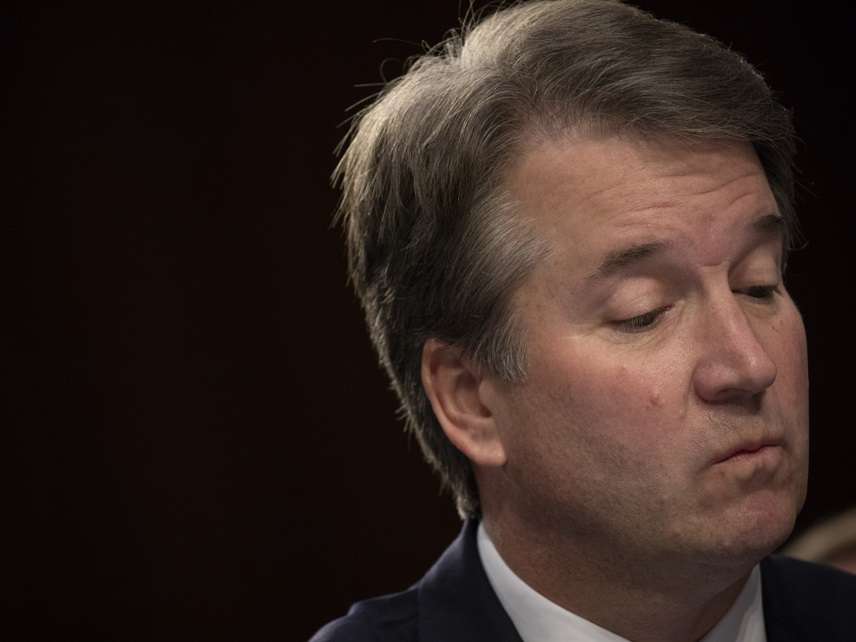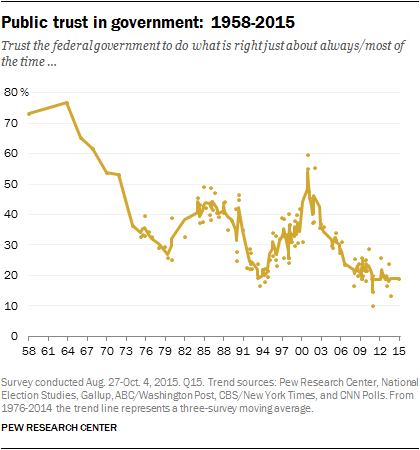Partisan Hackery, Supreme Court Confirmations, and the Decline of Public Trust
The Kavanaugh hearings are a great example of why voters rightly hold Congress in contempt.

If nothing else, the confirmation hearings for Brett Kavanaugh are an object lesson in how purely partisan politics can reduce human beings to utter garbage.
Following a late-breaking, credible accusation of a sexual assault that allegedly occurred in the early 1980s, when future Judge Kavanaugh was in high school, the outcome of his confirmation proceedings is far from clear. The details haven't been worked out fully, but there will be some sort of extra hearings next week in which Kavanaugh and his accuser, Christine Blasey Ford, will directly address the issue. There will likely be a vote next week too, which, with perhaps one or two GOP defections, will almost certainly proceed along strict party lines. That is, of course, what everyone knew would happen before Kavanaugh's hearings even started.
Virtually everyone acknowledges that given the nature of the accusations and the passage of time it may be impossible to ever know the truth of exactly what happened in that Bethesda bedroom so many years ago. Even Sen. Dianne Feinstein, the California Democrat who basically brought the charges to public view, admits as much. People of good faith can disagree about what should come next. But politics, especially in D.C. and especially when it comes to Supreme Court nominations, are rarely conducted in good faith. An astonishing set of statements makes that clear.
Ed Whelan is the head of the Ethics and Public Policy Center (EPPC), a conservative think tank that describes its mission as "defending American ideals." He's a former clerk for Antonin Scalia, co-editor of a bestselling collection of Scalia speeches, and a pioneer of legal blogging. He's also personally close to Kavanaugh and has helped various Republican nominees (John Roberts, Samuel Alito) thread their way through their Supreme Court confirmation hearings. Last night, in a series of detailed tweets that included floor plans of houses pulled from Zillow and other real-estate sites, he propounded a theory that Kavanaugh's accuser was confusing the judge with a lookalike classmate. Whelan advertised the coming tweetstorm days ago, writing, "By one week from today, I expect that Judge Kavanaugh will have been clearly vindicated on this matter. Specifically, I expect that compelling evidence will show his categorical denial to be truthful. There will be no cloud over him."
It didn't work out that way. Media, including many prominent voices on the right, immediately called out Whelan's fact-light speculation in real time:
A prominent DC conservative, trying to promote an alternate theory that someone else (and not Kavanaugh) may have sexually assaulted Professor Ford, named that person, showed photographs suggesting Ford confused the two and more. This is stunningly irresponsible.
— Jake Tapper (@jaketapper) September 20, 2018
If @EdWhelanEPPC doesn't have anything but Zillow links and Google maps and it turns out he went after a person who isn't responsible for an alleged sexual assault 36 years ago, he's going to end up in court for defaming a private figure.
— Ben Shapiro (@benshapiro) September 20, 2018
Whelan deleted the tweets and it's almost impossible to reconstruct their sheer craziness, especially as they unfolded in real time. He has apologized not so much for spinning a mistaken-identity theory out of thin air but for naming the person he thinks Ford confused with Kavanaugh. Ford has said unambiguously, "There is zero chance that I would confuse them."
If Whelan's fantasy trip shows the lengths to which a partisan activist will go in defense of a specific outcome, Sen. Dianne Feinstein (D–Calif.) represents an even more disturbing case. Feinstein knew about Ford's accusations since July but reportedly dismissed their importance and relevance to the Kavanaugh confirmation process. According to The New Yorker,
A source familiar with the committee's activities said that Feinstein's staff initially conveyed to other Democratic members' offices that the incident was too distant in the past to merit public discussion, and that Feinstein had "taken care of it."
After the letter's existence was outed by The Intercept, Feinstein finally shared a version of the letter with her colleagues and the FBI. Feinstein's reticence to show them the document sooner remains a mystery. She insists that it was partly out of concern for Ford, who originally wished to remain anonymous, but there were any number of ways the senator could have raised the issue without compromising her source. Did she think the story too old, unprovable, or unreliable? Did she think the die was cast for Kavanaugh no matter what, so why bother? Or did she or someone in her office leak the news as a hail-mary to stop the confirmation?
In any case, Feinstein's opposition to Kavanaugh has little or nothing to do with the sexual assault charge. In an op-ed for The Los Angeles Times that was published on September 16, she lays out her case for why she'll be voting no regardless of anything that might have come up in the confirmation process:
Democrats on the Senate Judiciary Committee entered the confirmation hearings for the Supreme Court nominee Brett Kavanaugh with concerns about his record and his views. After four days of testimony and questions, those concerns remain—and in some cases have increased considerably….
We already knew that Judge Kavanaugh held highly ideological views on the 2nd Amendment, women's reproductive rights and the executive power of the presidency. Judge Kavanaugh's testimony shed new light on these positions and on his loyalty to President Trump and his political agenda.
Supreme Court justices should not be an extension of the Republican Party. They must also have unquestionable character and integrity, and serious questions remain about Judge Kavanaugh in this regard, as indicated in information I referred to the FBI. For these and other reasons detailed below, I strongly oppose Judge Kavanaugh's nomination to the Supreme Court.

The charges by Christine Blasey Ford need to be addressed and will be next week, almost certainly in a manner that fully pleases no one. That is in large part due to Feinstein's own actions. As even Donald Trump could realize, she should have brought the matter up sooner in the process. Instead of a confirmation hearing that allows for a full airing of competing ideas and the exploration of different governing philosophies, we're treated to a spectacle that has collapsed into the worst sort of partisan mudslinging. The only achievement here is that right-wing partisans will walk away feeling as if the media and Democrats are using any means possible to stymie them. And liberals, feminists, and Democrats will feel like their concerns haven't been taken seriously. Both sides will have a point.
The last-gasp fabulism coming from the Ed Whelans of the world is pathetic, risible, and destructive. The only saving grace is that it isn't coming an actual elected leader such as Feinstein. According to one survey, just 3 percent of us strongly approve of Congress. Is it any wonder, given the way that its members act? In the waning months of the Obama presidency, the Republican Senate refused to hold confirmation hearings for Merrick Garland even though they had the votes to deny his confirmation to the Supreme Court. From a legal perspective, the Senate majority was within its rights to stall until a new president was in office (even if it had no reason to believe that a Republican, much less Donald Trump, would eventually be in power). But such an action is immensely corrosive of public trust even if it's technically permissible.
Nothing good comes when high-trust societies became low-trust societies. Americans aren't born cynical. We're made that way by the actions of elites such as Ed Whelan and officials such as Dianne Feinstein. And the trend toward cynicism won't end until they change their behavior.


Show Comments (326)